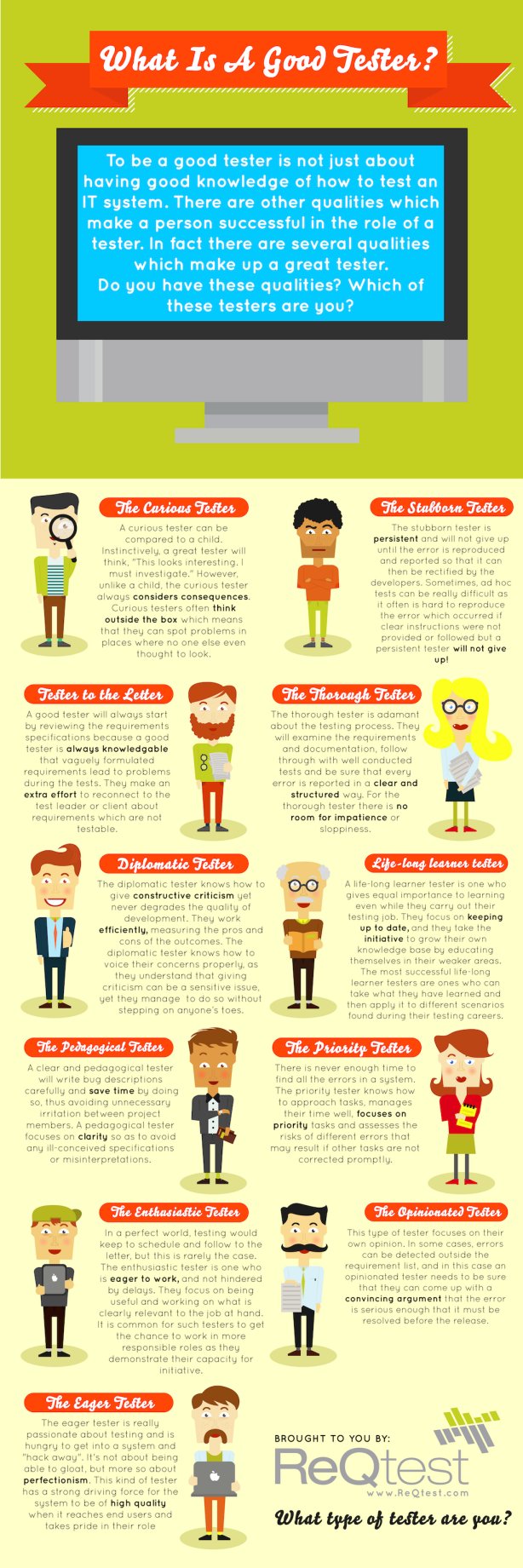August 7, 2012
What makes a great tester [INFOGRAPHIC]
There are lots of qualities and character traits associated with being a good, or great even, software tester. Being a tester is more than just about skills; it’s a mindset or way of life.
Of course, we are all different and unique so this makes for a rather varied collection of software testers worldwide. In this infographic, you’ll see some qualities or character which we think help to make one successful in the role of a tester.
Do you have these qualities yourself? Can you identify with one of the tester stereotypes, or is it perhaps a team mate that you see in the infographic below? Let us know in the comments section!
Click to expand the infographic!
What makes a great tester [INFOGRAPHIC]
What is a good tester?
To be a good tester is not just about having good knowledge of how to test an IT system. There are other qualities which make a person succesful in the role of a tester. In fact there are several qualities which make up a great tester.
Do you have these qualities? Which of these testers are you?
The Curious Tester
A curious tester can be compared to a child. Instinctively, a great tester will thing, “This looks interesting, I must investigate.” However, unlike a child, the curious tester always considers consequences. Curious testers often think outside the box which means that they can spot problem in places where no one else even thought to look.
The Stubborn Tester
The stubborn tester is persistent and will not give up until the error is reproduced and reported so that it can then be rectified by the developers. Sometimes, ad hoc tests can be really difficult as it is often hard to reproduce the error which occurred if clear instructions were not provided or followed, but a persistent tester will not give up!
Tester to the Letter
A good tester will always start by reviewing the requirements specifications because a good tester is always knowledgeable that vaguely formulated requirements lead to problems during the tests. They make an extra effort to reconnect to the test leader or client abut requirements which are not testable.
The Thorough Tester
The thorough tester is adamant about the testing process. They will examine the requirements and documentation, follow through with well conducted tests and be sure that every error is reported in a clear and structured way. For the thorough tester there is no room for impatience or sloppiness.
Diplomatic Tester
The diplomatic tester knows how to give constructive criticism yet never degrades the quality of development. They work efficiently, measuring the pros and cons of the outcomes. The diplomatic tester knows how to voice their concerns properly as they understand that giving criticism can be a sensitive issue, yet they manage to do so without stepping on anyone’s toes.
Life-long learner tester
A life-long learner tester is one who gives equal importance to learning even while they carry out their testing job. The focus on keeping up to date and they take the initiative to grow their own knowledge base by educating themselves in their weaker areas. The most successful life-long learner testers are ones who can take what they have learned and then apply it to different scenarios found during their testing careers.
The Pedagogical Tester
A clear and pedagogical tester will write bug descriptions carefully and save time by doing do, thus avoiding unnecessary irritations between project members. A pedagogical tester focuses on clarity so as to avoid any ill-conceived specifications or misinterpretations.
The Priority Tester
There is never enough time find all the errors in a system. The priority test knows how to approach tasks, manages their time well, focuses on priority tasks and assesses the risks of different errors that may result if other tasks are not corrected promptly.
The Enthusiastic Tester
In a perfect world, testing would keep to schedule and follow to the letter, but this is rarely the case. The enthusiastic tester is one who is eager to work, and not hindered by delays. They focus on being useful and working on what is clearly relevant to the job at hand. Ot is common for such testers to get the chance to work in more responsible roles as they demonstrate their capacity for initiative.
The Opinionated Tester
This type of tester focuses on their own opinion. In some cases, errors can be detected outside the requirements list, and in this case an opinionated tester needs to be sure that they can come up with a convincing argument that the error is serious enough that it must be resolved before the release.
The Eager Tester
The eager tester is really passionate about testing and is hungry to into a system and ‘hack away’. It’s not about being able to gloat, but more so about perfectionism. This kind of tester has a strong driving force for the system to be of high quality when it reaches end users and takes pride in their role.
And what type of tester are you?
Share article
